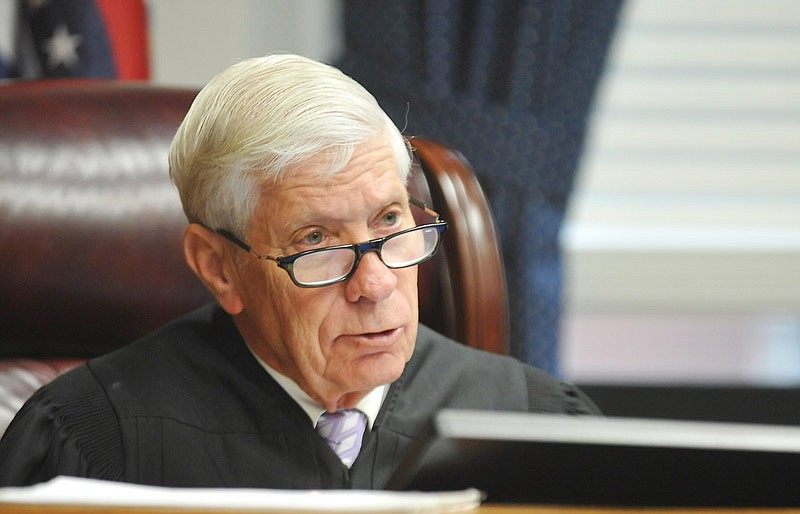A Wisconsin political science professor told Cole County Senior Judge Richard Callahan on Tuesday there is "no question that voter ID laws reduce voter turnout - the only question is, how large the effect is."
Kenneth Mayer, who has been teaching at the University of Wisconsin-Madison since 1989, has spent much of his career studying and researching election administration and voting laws around the country.
He said research shows voter ID laws "have a disproportionate effect on minorities (and) poor populations," and those "vulnerable populations are less likely to possess the most common forms of ID."
His opinion is based on his own research and his "reading of the literature."
Mayer acknowledged some studies show voter ID laws increase turnout, but he said those studies are not credible.
"The theory behind them is inconsistent with almost everything else that we know about voting," Mayer said. "The idea that you add a complicated administrative requirement (and it) will actually increase turnout makes no sense."
He said the argument frequently is made that voter ID laws increase turnout because they increase voter confidence in the electoral system.
"That is, people think their vote is going to be counted and they think the election process is fair, so they will vote when they previously wouldn't," he testified. "The only problem is, there's no evidence that this is true."
Mayer agreed with the state's argument officials want to make sure there's no fraud in the elections process and that people don't identify themselves at the poll as someone else, in order to vote instead of that person.
"There are examples of voter impersonation," Mayer testified. "The key is that those examples are so infrequent that it is vanishingly rare.
"And that's different from something like alien abduction, which - based on everything we think we know about science - is impossible."
Assistant Attorney General Ryan Bangert recalled plaintiff Mildred Gutierrez' Monday testimony, that her father won a seat on the Holts Summit Board of Alderman about 45 years ago, by a single vote.
"A single instance of voter impersonation fraud in that race could have made a difference," Bangert suggested.
But, Mayer replied, "preventing an otherwise qualified voter from voting when they should have been allowed to vote would also affect that race."
He testified, there is evidence in Missouri and other states, that voter ID laws have prevented some otherwise properly registered voters from casting ballots, and provisional ballot rules have allowed people to vote - but their votes ultimately weren't counted.
David King, of St. Louis, testified Tuesday he was turned away from his polling place Aug. 7 because he had his official voter registration card but had forgotten to bring his driver's license.
He later returned with that license and was allowed to vote.
But, he said, no one offered him any of the alternative ways to vote that are part of the new law - even though a poll worker identified him by name as he walked into the polling place.
"I've been going to the same voting place all this time," King said. "They know who I am - and now they're telling me I can't vote?
"They let me leave without voting."
Mayer, who had listened to King's testimony, said that was one example of election officials themselves not understanding the new law and how it is to be implemented.
He said his check of several different Missouri counties' websites showed different pieces of information - and not all of it clearly in-line with the new law's provisions.
Under cross-examination, Mayer acknowledged his opinion about Missouri's law and its possible effects on voters was based on his reading of the law and on studies made in other states.
He testified he had not conducted interviews or surveys in Missouri, but added: "I have every reason to believe that a survey conducted in Missouri would show that."
In all, Mayer spent more than four hours testifying Tuesday, during the second day of the trial in a lawsuit challenging Missouri's new voter ID law.
That law went into effect July 1, 2017, after voters in November 2016 added language to the Missouri Constitution that said lawmakers "may" require someone "seeking to vote in person in public elections to identify himself or herself and verify his or her qualifications as a citizen of the United States of America and a resident of the state of Missouri by providing election officials with a form of identification, which may include valid government-issued photo identification."
The lawsuit argues the new law authorized by the amendment conflicts with existing constitutional language that says people who are properly registered to vote "are entitled" to vote at all elections.
But, lawyers representing Secretary of State Jay Ashcroft have countered, the 2016 amendment does modify that previous language and the new law is valid.
Mayer is a 1982 graduate of the University of California-San Diego, and earned his master's and doctorate degrees in political science from Yale University in 1988.
He testified his role as an expert witness "is to provide advice and information and opinions about technical, statistical, specialized issues that will be useful to a judge in evaluating the effect of - in the cases I'm working on - changes in election law or the effects of a particular election practice."
In his career, he said he's worked for Democrat and Republican groups, he doesn't take an advocacy role nor does he agree to support the views of those who hire him.
However, he said under cross examination, he never has testified in favor of a voter ID law.

